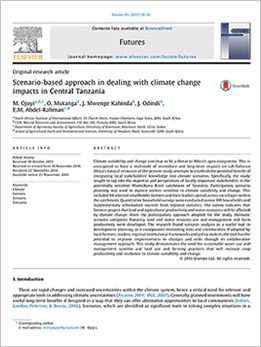Climate variability and change continue to be a threat to Africa’s agro-ecosystems. This is anticipated to have a multitude of immediate and long-term impacts on sub-Saharan Africa’s natural resources of the present study attempts to establish the potential benefit of integrating local stakeholders’ knowledge into climate scenarios. Specifically, the study sought to tap into the expertise and perspectives of locally important stakeholders in the potentially sensitive Wami/Ruvu River catchment of Tanzania. Participatory scenario planning was used to explore sectors sensitive to climate variability and change. This included 84 selected smallholder farmers and their leaders spread across six villages within the catchment. Quantitative household surveys were conducted across 199 households and Supplementary information sourced from regional statistics. The survey indicates that farmers project that land and agricultural productivity and water resources will be affected by climate change. From the participatory approach adopted for the study, thematic scenario categories featuring land and water resource-use and management and farm productivity were developed. The research found scenario analysis as a useful tool in development planning, as it incorporates interacting risks and uncertainties. If adopted by local farmers, leaders, regional institutional frameworks and policy makers, the tool has the potential to improve responsiveness to changes and risks through its collaborative management approach. This study demonstrates the need for sustainable water use and management systems and land use and farming practices that will increase crop productivity and resilience to climate variability and change.
Scenario-based approach in dealing with climate change impacts in Central Tanzania



